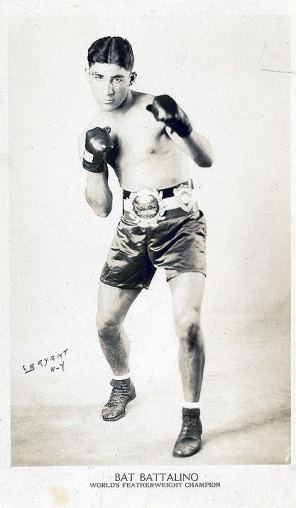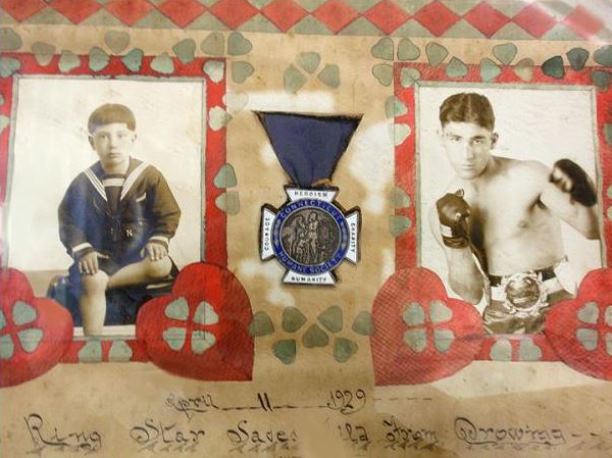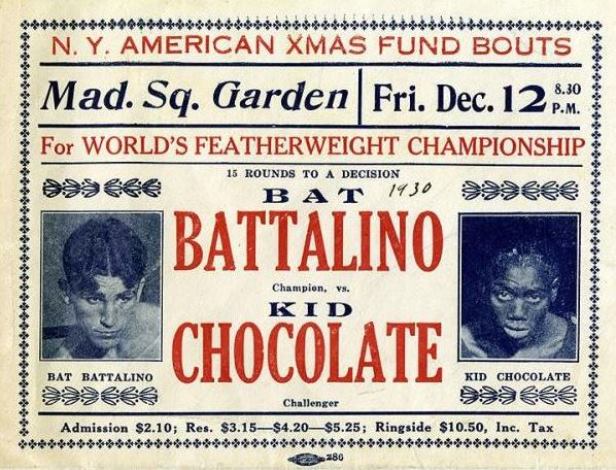By Mike Messina
From the streets of Hartford to Madison Square Garden was a giant leap for featherweight boxer Christopher “Bat” Battalino. Born in Hartford in 1908, Battalino quit Brown School after the fifth grade to work in a tobacco factory. He got his boxing start in amateur bouts and went all the way to the national amateur featherweight championship before turning pro when he was 21 years old.

Christopher “Bat” Battalino, born 1908. He won the world professional championship as a featherweight from Frenchman Andre Routis in September 1929 at the Velodrome in East Hartford – Connecticut Historical Society
Bat was in the featherweight weight class for boxing, which meant he never weighed more than 126 pounds. A tenacious and long-lasting boxer, Battalino fought in Connecticut for the first 24 fights of his career and lost only one match on his home soil. Some of these matches took place in the Velodrome, the Foot Guard Hall, and Bulkeley Stadium in Hartford. Bat won the world professional featherweight championship from Frenchman André Routis in September 1929 at Hurley Stadium in East Hartford. From there, he went on to fight notable boxers across the country, peaking with his defending title fight against Eligio Sardiñas Montalvo (a Cuban boxer nicknamed “Kid Chocolate”) in New York City in 1930.
“It was a big thing for me to prove to all those people that I was a real champion. I had never fought in New York before, and some people said I was a cheese champion, and that I was afraid to risk my title here. I hope they like me now.”
– “Bat” Battalino, 1930, interview with Sid Mercer after Bat’s win versus Kid Chocolate in New York City
Featherweight Boxing Champ Becomes a Life Saver
Not only was Bat a hero in the ring, he was also a hero in his local community. On April 11, 1929, he was walking across the Front Street Bridge over the Park River when he saw a boy near the bank of the river. He called out and told the child to get away from the bank, but then he saw the head of another boy beneath the cold, murky water. Bat jumped in and immediately and rescued Louis Casconi, a three-year-old who had slipped and fallen into the river. Bat was able to resuscitate Louis and saved the boy’s life. The Connecticut Humane Society awarded him a medal for his courageous effort.
Bat retired from the ring in 1940, after winning 58 of his 88 professional fights. His only knockout defeat occurred at the hands of Billy Petrolle in New York in 1932. He became a construction worker, and late in life he helped to build the Hartford Civic Center. He died in 1977.
Mike Messina is the Interpretive Projects Associate at the Connecticut Historical Society.
© Connecticut Public Broadcasting Network and Connecticut Historical Society. All rights reserved. This article originally appeared on Connecticut History | WNPR News
Note: ConnecticutHistory.org does not edit content originally published on another platform and therefore does not update any instances of outdated content or language.

Medal and certificate given to Battalino for saving the life of Louis Casconi. The certificate has images of both Casconi and Battalino. 1930 – Connecticut Historical Society









